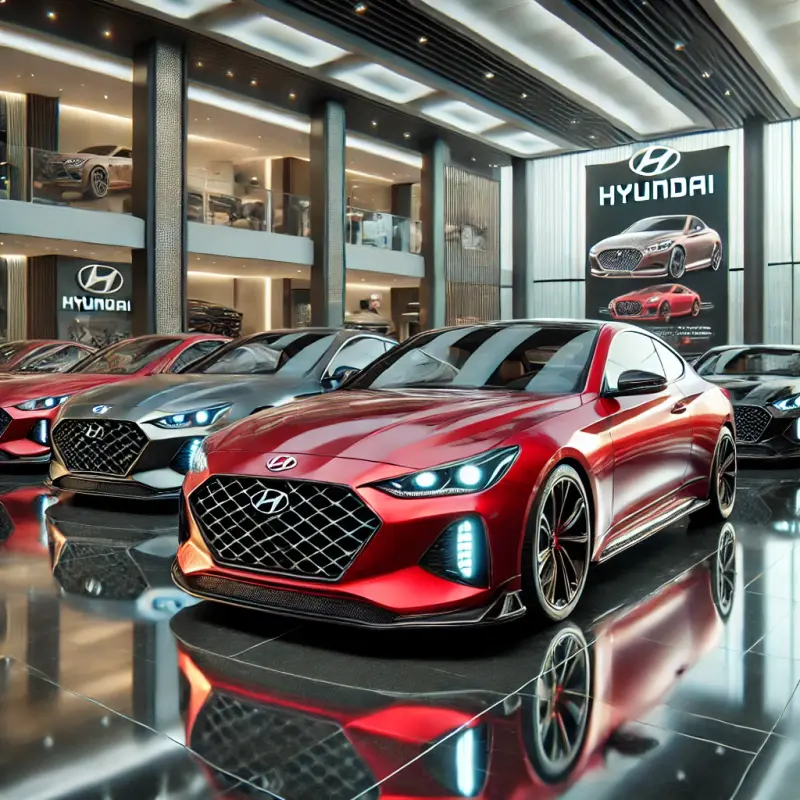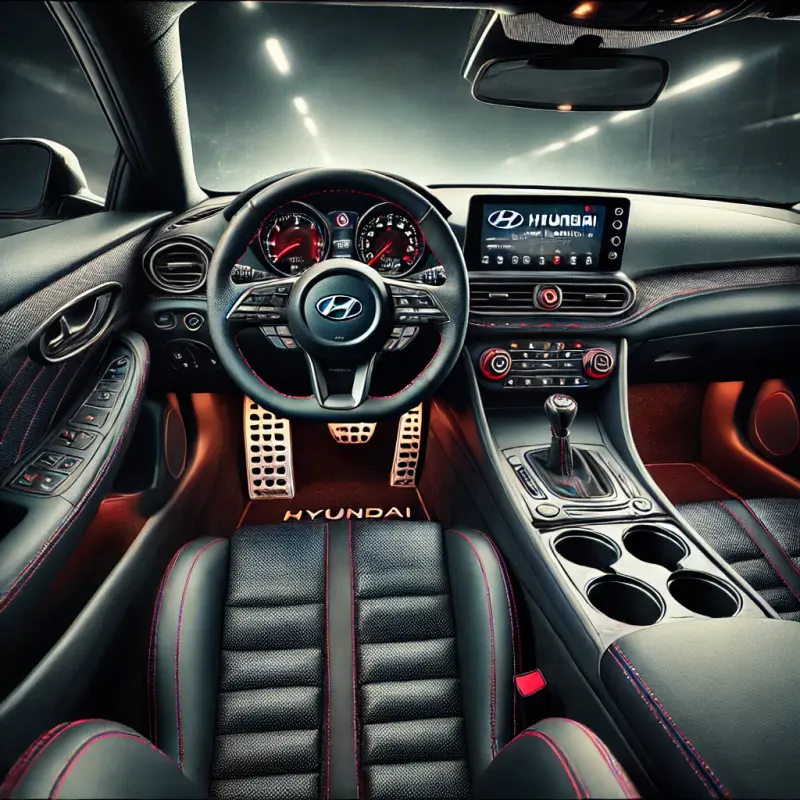
Click here to view our latest HYUNDAI GENESIS inventory.
The Hyundai Genesis Coupe: A Bold Step Into Performance and Luxury
The Hyundai Genesis Coupe is one of those vehicles that surprises you at first glance. Hyundai, traditionally known for building reliable and affordable cars, took a bold step in 2008 when it unveiled the Genesis Coupe. With the Genesis Coupe, Hyundai sought to enter the competitive world of performance cars, and the result was nothing short of remarkable. Combining sleek styling, strong performance, and a price point that undercut its rivals, the Genesis Coupe quickly became a favorite among car enthusiasts and casual drivers alike.
This blog will take you through the history, design, performance, and legacy of the Hyundai Genesis Coupe, detailing why it stands out in the world of performance-oriented vehicles.
The Birth of the Genesis Coupe
The story of the Hyundai Genesis Coupe began with Hyundai’s desire to expand its product lineup beyond the typical sedans and compact cars that had defined the brand for decades. Hyundai was looking for ways to elevate its reputation, aiming to compete with more premium and performance-focused brands like BMW, Audi, and Nissan. With a market dominated by American muscle cars and European luxury vehicles, Hyundai recognized a gap in the market for a car that combined the elements of luxury, performance, and affordability.
The first Genesis Coupe was introduced in 2008 at the North American International Auto Show in Detroit. It was a bold move for Hyundai, signaling their ambitions to compete in the sports coupe market with a vehicle that could rival established names like the Nissan 350Z, Ford Mustang, and Chevrolet Camaro. The coupe was based on the rear-wheel-drive architecture of the Genesis sedan, which had debuted earlier in 2008, and it was designed to offer driving enthusiasts an affordable option that didn’t compromise on style or performance.

Click here to view our latest HYUNDAI GENESIS inventory.
Design and Styling
From the very first generation, the Hyundai Genesis Coupe stood out for its striking design. Unlike many other vehicles in its class, the Genesis Coupe was designed with a focus on creating a sleek, modern look that also conveyed a sense of power and performance. The coupe had an aggressive stance, with wide fenders, a low roofline, and a muscular rear end that made it look like it was ready to take on the road.
The front of the Genesis Coupe was defined by its large, angular headlights, a sculpted hood, and a wide grille that gave it a bold and athletic presence. The long body and short overhangs gave the coupe a balanced and proportionate look, while the rear featured a prominent spoiler and dual exhaust outlets, further emphasizing its performance-oriented nature.
Inside, the Genesis Coupe carried the same level of refinement and sophistication that Hyundai had come to be known for. The interior featured high-quality materials, modern technology, and a driver-focused cockpit. The seats were designed to offer both comfort and support, ideal for both daily driving and spirited driving. The dashboard was clean and minimalistic, with easy-to-use controls and a touchscreen infotainment system. The cabin was spacious for a two-door coupe, offering ample legroom and headroom for both front and rear passengers.
Performance: Engine Options and Driving Experience
When it came to performance, the Hyundai Genesis Coupe did not disappoint. The first-generation model was offered with a range of engine options that allowed buyers to choose the performance level that best suited their driving style and preferences.
The Four-Cylinder Turbocharged Engine: A Strong Start
At the entry level, the Genesis Coupe came equipped with a 2.0-liter turbocharged inline-four engine. This engine produced around 210 horsepower and 223 lb-ft of torque, which was more than enough power for everyday driving. The turbocharged four-cylinder engine provided a smooth balance of performance and fuel efficiency, making the Genesis Coupe a fun car to drive while still being relatively affordable to operate.
For many drivers, this engine was ideal, offering plenty of power for spirited driving without being overwhelming. The 2.0T version of the Genesis Coupe featured rear-wheel drive and was paired with either a six-speed manual or an optional five-speed automatic transmission. With the manual gearbox, the Genesis Coupe offered a responsive and engaging driving experience, with smooth shifts and plenty of torque for a thrilling ride.
The V6: A Leap Into Performance
For those who wanted even more power, the 3.8-liter V6 engine was available. This engine generated 306 horsepower and 266 lb-ft of torque, making it a significant step up from the four-cylinder option. The V6 engine was capable of propelling the Genesis Coupe from 0 to 60 mph in just under six seconds, putting it in direct competition with more established performance coupes in the market.
The 3.8-liter V6 was paired with either a six-speed manual transmission or an optional eight-speed automatic transmission. With the V6 engine, the Genesis Coupe became a true performance car, offering a thrilling driving experience that was both fast and agile. The V6 model also featured upgraded suspension and handling components, making it a joy to drive on twisty backroads or the open highway.
The R-Spec: Performance at Its Peak
For enthusiasts looking for the ultimate performance experience, Hyundai introduced the R-Spec trim, which was designed to offer even more thrilling driving dynamics. The R-Spec version of the Genesis Coupe was equipped with the 3.8-liter V6 engine and featured a sport-tuned suspension, limited-slip differential, and upgraded brakes, making it the most performance-focused model in the Genesis Coupe lineup.
The R-Spec model had a more aggressive stance, with a lower ride height, upgraded wheels, and a sportier interior. It was designed for drivers who wanted a more track-ready car that could handle the demands of high-performance driving without breaking the bank.
Technology and Features
Hyundai equipped the Genesis Coupe with a range of advanced technology and features that enhanced both comfort and convenience. The base models came with features like keyless entry, Bluetooth connectivity, and a basic audio system, while higher trims offered more premium options like leather upholstery, a premium sound system, navigation, and a rearview camera.
One of the standout features of the Genesis Coupe was its intuitive infotainment system, which included a touchscreen interface, navigation, and various connectivity options. Hyundai also included a range of safety features, such as anti-lock brakes, traction control, stability control, and multiple airbags, to ensure that the Genesis Coupe was as safe as it was fun to drive.
The Genesis Coupe in the Market: Success and Challenges
When the Genesis Coupe was first launched, it made an immediate impact. The combination of sleek styling, strong performance, and an affordable price point allowed it to attract a diverse range of buyers, from young enthusiasts to more mature drivers looking for an exciting yet practical car. The Genesis Coupe quickly gained a following and became a strong competitor in the performance coupe segment.
However, despite its initial success, the Genesis Coupe faced several challenges. As the performance market evolved, Hyundai’s competitors introduced new models with more powerful engines, better handling, and more advanced technology. The Genesis Coupe struggled to maintain its competitive edge as other automakers pushed the boundaries of performance and innovation.
In addition, Hyundai’s focus began to shift toward more mainstream vehicles, and the company decided to phase out the Genesis Coupe after the 2016 model year. The Genesis Coupe was replaced by the more refined and luxurious Hyundai Veloster N, which continued to push the brand's performance aspirations but in a different segment.
The Legacy of the Hyundai Genesis Coupe
Although the Hyundai Genesis Coupe was discontinued after 2016, its impact on the automotive industry is still felt today. The Genesis Coupe demonstrated that Hyundai was capable of producing more than just economical sedans—it could build exciting, performance-oriented cars that appealed to enthusiasts.
The Genesis Coupe helped establish Hyundai as a serious player in the performance car market and paved the way for future models like the Hyundai Veloster N and the Hyundai Elantra N, which continue to push the brand’s performance capabilities. The Genesis Coupe was also a stepping stone in Hyundai’s broader strategy of moving toward more premium vehicles, as seen in the luxury-oriented Genesis brand, which now offers models like the Genesis G70 and G80 sedans.
Conclusion
The Hyundai Genesis Coupe may not have had the longevity of some of its competitors, but its impact on the automotive world cannot be overstated. It was a car that defied expectations, offering impressive performance and sleek styling at an affordable price point. Whether you were behind the wheel of the base 2.0T or the high-performance R-Spec V6, the Genesis Coupe offered a driving experience that was both thrilling and accessible.
Hyundai may have discontinued the Genesis Coupe, but its legacy lives on in the brand’s ongoing pursuit of performance and innovation. For those who had the privilege of driving one, the Hyundai Genesis Coupe will always hold a special place in the hearts of automotive enthusiasts.

Click here to view our latest HYUNDAI GENESIS inventory.